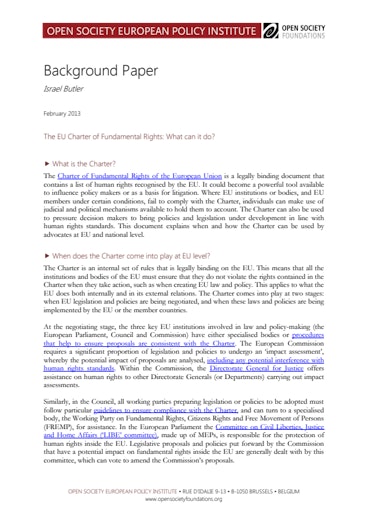The Charter of Fundamental Rights of the European Union is a legally binding document that contains a list of human rights recognised by the European Union (EU). It could become a powerful tool available to influence policy makers or serve as a basis for litigation. Individuals can use judicial and political mechanisms to hold EU institutions, and in certain circumstances member countries, to account when they fail to comply with the Charter. The Charter can also be used to pressure decision makers to bring policies and legislation under development in line with human rights standards. This background paper explains when and how the Charter can be used by advocates at national and EU level.
Download
-
The EU Charter of Fundamental Rights: What can it do? (314.62 Kb pdf file)
Download the full briefing paper here.
Read more
Voices
The Justice Scoreboard: An Effective Mechanism to Enforce Respect for the Rule of Law?
A new Justice Scoreboard will assess the justice systems of the 27 EU member states on the basis of strength, efficiency and reliability. But how effective can it really be?
Rethinking the EU
In an Age of Crisis, an Opportunity to Remake the EU

From climate change to rising authoritarianism, Europe is facing a range of crises that threaten the way we live. The EU must seize the opportunity to reshape how it works and rethink what role it plays in a changing world.
Corporate Responsibility
Q&A: Why (Some) Investors Want More Regulation

As the EU works on rules to protect worker rights and the planet from corporate harm, Open Society’s Jon Jacoby spoke to Anita Dorett, of the Investor Alliance for Human Rights, about how investors are pushing for change.
